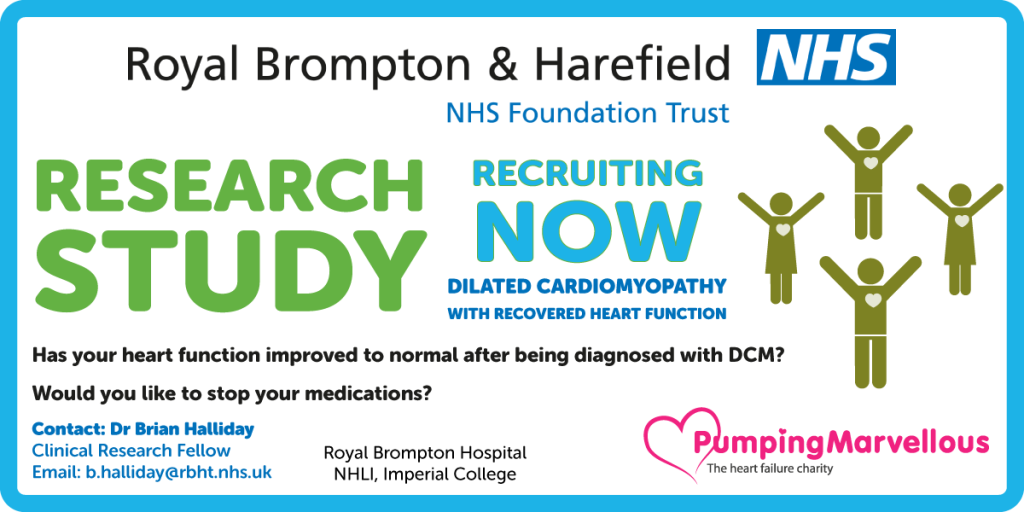New Dilated Cardiomyopathy Study TRED

The Royal Brompton Hosptial Are Seeking DCM Patients for a New Dilated Cardiomyopathy Study TRED
Researchers at the Royal Brompton Hospital, and the NHLI (National Heart and Lung Institute) are to begin a new BHF-funded dilated cardiomyopathy study. They are currently inviting patients with a previous DCM diagnosis, whose heart function has recovered after a period on medical therapy, to join a trial [TRED] to explore whether the recovery of heart function represents a cure and whether it is safe for patients to stop their medications.
Dilated Cardiomyopathy with recovered heart function
Therapy withdrawal in REcovered Dilated cardiomyopathy [TRED]
CLICK HERE TO SEE TRED TRIAL SUMMARY
CLICK HERE TO FIND OUT HOW TO SIGN UP TO THE TRED TRIAL
Has your heart function improved to normal after being diagnosed with dilated cardiomyopathy?
Would you like to stop your medications? Find out more about the new, dilated cardiomyopathy study.
Currently, it is unclear whether patients continue to derive benefit from medications after their heart function has recovered.
In this new dilated cardiomyopathy study, the team plan to withdraw medications gradually in a structured supervised fashion. They will use heart (MRI) scans, exercise tests and blood tests to monitor heart function. If there are any early signs of a reduction in heart function they will re-establish patients on medication immediately.
What is the purpose of the new Dilated Cardiomyopathy study TRED?
The aim of the study is to determine whether it is safe and feasible for patients with a prior diagnosis of dilated cardiomyopathy and recovered heart function, to stop their heart failure medications.
Dilated cardiomyopathy (DCM) is the most common disease of the heart muscle and can be caused by many different things including genetic differences, infections and excess alcohol consumption. It is characterised by a reduction in function and increase in size of the heart’s pumping chambers. In 1 in 3 patients, the heart function improves and returns to normal with medications. A question we are often asked by patients is whether they need to continue their medications after their heart function has recovered. Currently there is little research for doctors to base their answer on and no consensus about the best approach. Patients therefore often receive a variety of answers from different doctors.
This study gives participants the opportunity to come off medications in a supervised, monitored fashion, not ordinarily available otherwise. If there is any sign of worsening heart function, patients will be put back on medications at the earliest opportunity, reducing the chances of coming to any harm as a result of stopping medications to the smallest possible level.
Find out more: A Randomised-Controlled Pilot Trial of The Feasibility And Safety Of Therapy Withdrawal In
Asymptomatic Patients With A Prior Diagnosis Of Dilated Cardiomyopathy & Recovered Cardiac Function, co-ordinated by Dr Brian Halliday (BHF Clinical Research Fellow)
Royal Brompton Hospital; NHLI, Imperial College, London

